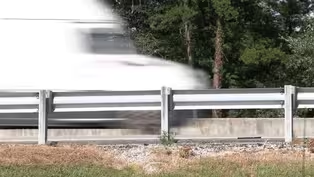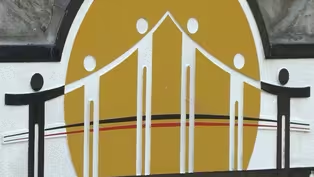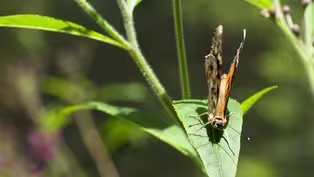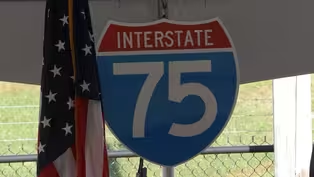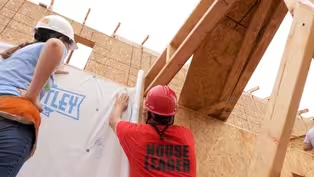
Kentucky Couple Raising Awareness About Organ Donation
Clip: Season 4 Episode 32 | 4m 35sVideo has Closed Captions
Sharon Hays is on a mission to raise awareness about organ donation.
A Lexington woman is on a mission to raise awareness about organ donation. Sharon Hays is among the more than 100,000 Americans on the national organ transplant waiting list, according to the Health Resources and Services Administration. Now she and her husband, a long-time educator in Kentucky, are working to inform the public about the benefits of being a living donor.
Problems playing video? | Closed Captioning Feedback
Problems playing video? | Closed Captioning Feedback
Kentucky Edition is a local public television program presented by KET

Kentucky Couple Raising Awareness About Organ Donation
Clip: Season 4 Episode 32 | 4m 35sVideo has Closed Captions
A Lexington woman is on a mission to raise awareness about organ donation. Sharon Hays is among the more than 100,000 Americans on the national organ transplant waiting list, according to the Health Resources and Services Administration. Now she and her husband, a long-time educator in Kentucky, are working to inform the public about the benefits of being a living donor.
Problems playing video? | Closed Captioning Feedback
How to Watch Kentucky Edition
Kentucky Edition is available to stream on pbs.org and the free PBS App, available on iPhone, Apple TV, Android TV, Android smartphones, Amazon Fire TV, Amazon Fire Tablet, Roku, Samsung Smart TV, and Vizio.
Providing Support for PBS.org
Learn Moreabout PBS online sponsorshipA Lexington woman is on a mission to raise awareness about organ donation.
Sharon Hayes is among the more than 100,000 Americans on the national Organ transplant waiting list, according to the Health Resources and Services Administration.
Now, she and her husband, a longtime educator in Kentucky, are working to inform the public about the benefits of being a living donor.
More about this story in today's medical news.
It initially started when I found out that I had a birth defect in my pancreas, and so I was constantly having stents put in and taken out for about, 15 years at least.
And so I found a doctor in Louisville that removed my pancreas.
His kind of call was to say, no pancreas, no pain.
And, during that, they take the, cells from your liver or from your pancreas and put them into your liver so that you hopefully will not be a diabetic.
It's called an islet cell transfer clamp.
So that had not worked for me.
I became a type one diabetic immediately moving forward.
I kept having digestion problems, and, I said, you know, I've always wanted to be seen at Mayo Clinic.
They put me with their GI people, and, they said that, my liver was scarred.
And that I would possibly need a liver transplant.
So I was there for an evaluation.
Found out that I had breast cancer.
And so that required a year of chemo and radiation and a surgery which damaged my kidneys or my liver even further.
Mayo has a very high success rate.
It's like 99.1 or something even higher.
You know, it's close to 100%.
And what we're referring to, just to be more clear, is, is a living liver donation, which most people are not, as familiar with.
They open, you know, your system up and remove a portion of your liver and transplant it into the recipient.
So Sharon would get a portion of the donor's, liver.
And both sections of the liver regenerate themselves within about two months.
Most people don't understand that.
Their liver.
It's such an incredible organ.
It regenerates itself and grows back and so that's why we want to make sure people first of all understand there is a shortage in supply.
We need more people to be willing to donate organs.
Most people are familiar with, getting a cadaver, as a liver donation.
And that is a possibility for Sharon.
But, she most likely would not be eligible to get that because of the shortage in supply until she's much sicker.
And this doesn't make any sense to see her getting sicker after everything she's been through.
It's the matter of life and death.
That would improve my quality of life so much, it would mean more time with my children.
More time with Tom.
More time to have a normal life.
You know, I'm.
I'm a lifelong educator.
It's what I've done is my career.
And, I believe people, if they knew of this procedure and how simple it is, there are enough people out there who are willing to to, you know, consider being a transplant, a donor for a transplant.
Obviously, we want Sharon to get, a donor, but if nothing else, if more people become aware of it and consider donation and, you know, help the shortage and supply, it's a positive thing.
According to Donate Life America, 17 people die each day while waiting for an organ transplant.
Alleged Fraud Prompts Calls for Investigation
Video has Closed Captions
Clip: S4 Ep32 | 55s | Alleged Fraud in Driver's Licensing System Prompts Calls for Investigation (55s)
Center Serving Adults With Autism Gaining Attention
Video has Closed Captions
Clip: S4 Ep32 | 3m 49s | The program in Bowling Green has gained state and nation-wide attention. (3m 49s)
Exploring Nature at Lost River Cave
Video has Closed Captions
Clip: S4 Ep32 | 3m 56s | Its most well-known attraction is an underground boat tour. (3m 56s)
I-75 Widening Project Enters New Phase
Video has Closed Captions
Clip: S4 Ep32 | 2m 46s | A major infrastructure project in Kentucky is entering its next phase. (2m 46s)
Warren County Leaders Preparing For Future Growth
Video has Closed Captions
Clip: S4 Ep32 | 4m 28s | Studies show the county could double in size by 2050. (4m 28s)
Providing Support for PBS.org
Learn Moreabout PBS online sponsorship
- News and Public Affairs

Top journalists deliver compelling original analysis of the hour's headlines.

- News and Public Affairs

FRONTLINE is investigative journalism that questions, explains and changes our world.












Support for PBS provided by:
Kentucky Edition is a local public television program presented by KET
